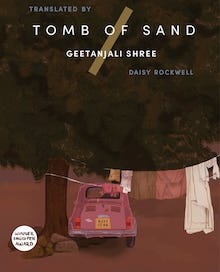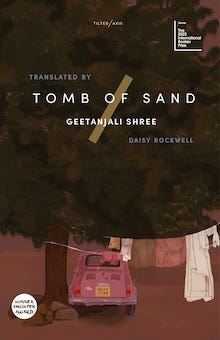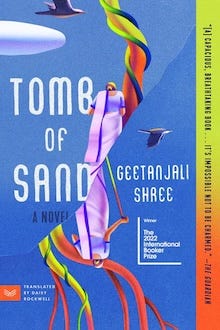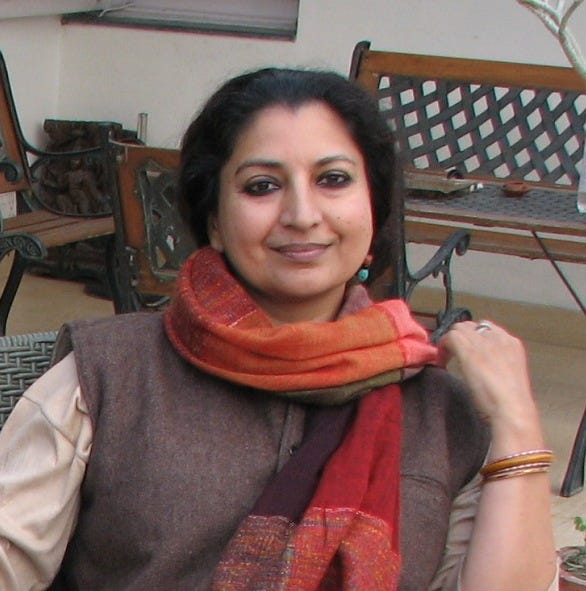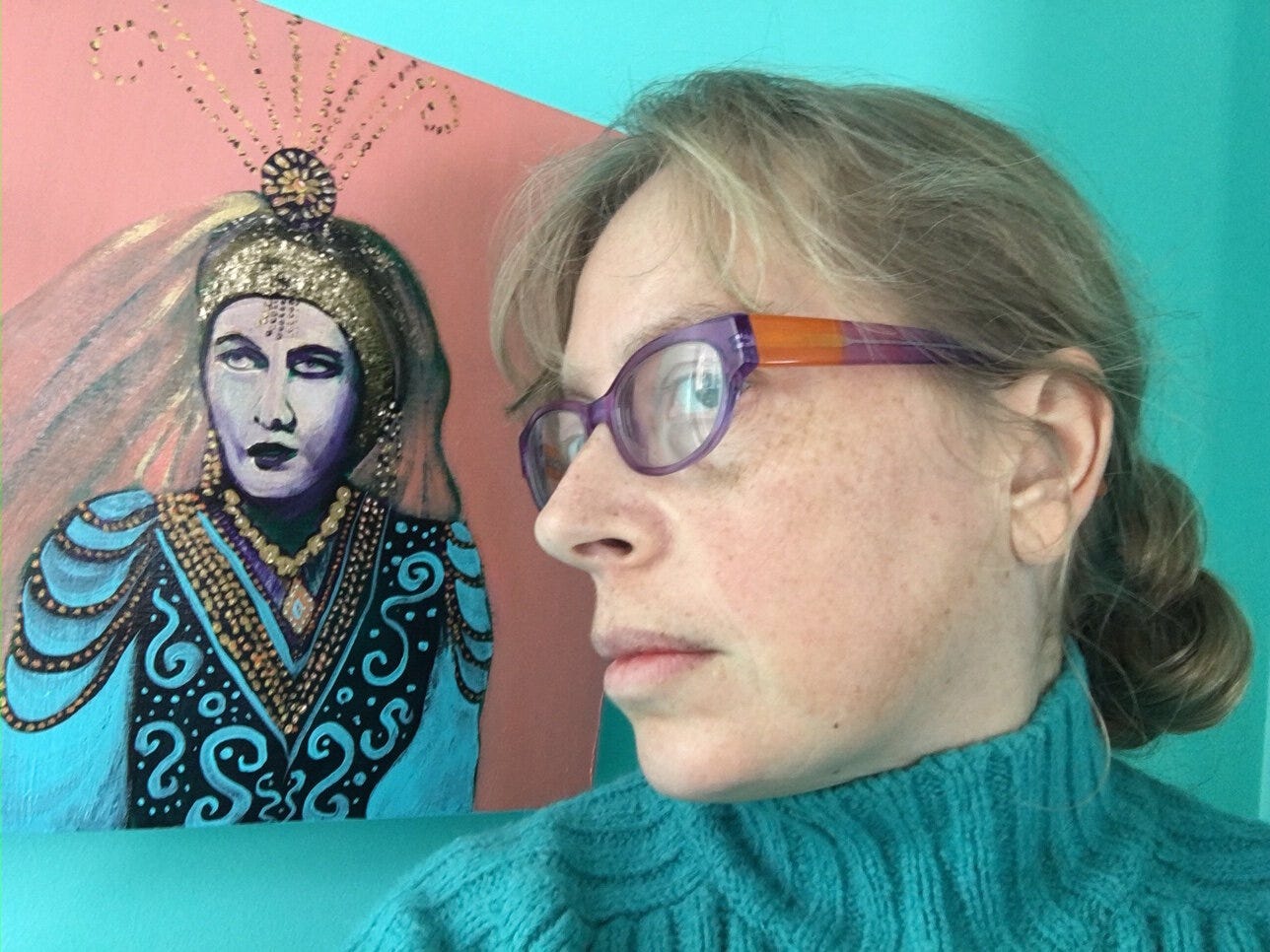Season 27 of the Two Month Review: "Tomb of Sand" by Geetanjali Shree & Daisy Rockwell
This season we're reading the first ever novel translated from an Indian language to win the International Booker.
One quick housekeeping note: Brian is unavailable this week, so we’re going to post the final episode on The Golden Notebook by Doris Lessing next Thursday, June 26. Then, as you’ll see below, the first episode of the next season will drop on Thursday, July 3, just in time for the long weekend!
There are main three reasons why I recommended we dedicate a season of the Two Month Review to Tomb of Sand by Geetanjali Shree, translated from the Hindi by Daisy Rockwell: the fact it won the 2022 International Booker (and was the first book from an Indian language to do so), my recent trip to New Delhi, sponsored by SALT, to research Indian literature (with an aim to publishing more of it), and the Armory Square Prize for South Asian Literature in Translation.
Or, in short, as Open Letter starts doing more South Asian books (the one indian author we’ve published to date is Subimal Misra, who is more experimental than most any contemporary European writer I’ve read), I’d like to learn more about literature from this region by reading some amazing books. Also, Daisy Rockwell is amazing.
From HarperCollins:
“A tale tells itself. It can be complete, but also incomplete, the way all tales are. This particular tale has a border and women who come and go as they please. Once you’ve got women and a border, a story can write itself . . .”
Eighty-year-old Ma slips into a deep depression after the death of her husband. Despite her family’s cajoling, she refuses to leave her bed. Her responsible eldest son, Bade, and dutiful, Reebok-sporting daughter-in-law, Bahu, attend to Ma’s every need, while her favorite grandson, the cheerful and gregarious Sid, tries to lift her spirits with his guitar. But it is only after Sid’s younger brother—Serious Son, a young man pathologically incapable of laughing—brings his grandmother a sparkling golden cane covered with butterflies that things begin to change.
With a new lease on life thanks to the cane’s seemingly magical powers, Ma gets out of bed and embarks on a series of adventures that baffle even her unconventional feminist daughter, Beti. She ditches her cumbersome saris, develops a close friendship with a hijra, and sets off on a fateful journey that will turn the family’s understanding of themselves upside down.
Rich with fantastical elements, folklore, and exuberant wordplay, Geetanjali Shree’s magnificent novel explores timely and timeless topics, including Buddhism, global warming, feminism, Partition, gender binary, transcending borders, and the profound joys of life. Elegant, heartbreaking, and funny, it is a literary masterpiece that marks the American debut of an extraordinary writer.
This sounds incredibly interesting, and is only backed up by what former TMR guest Frank Wynne had to say when asked why it won the International Booker:
While any of the shortlisted books would have been a worthy winner, we were won over by the joyous polyphony of Tomb of Sand, which explores crucial issues of grief, identity and belonging with wit and humour, while being powerfully human. I have read nothing like it, this year or any year. It is profoundly intimate, yet has an epic sweep; it is tender, funny and yet profound. It is a major addition not simply to the literature of India and of partition, but speaks to readers around the world about loss and love, exile and homecoming, the borders that constrain us—personal, political and geographic—and how they can be overcome.
And fellow judge Jeremy Tiang (translator of Zou Jingzhi’s Ninth Building):
Of all the books we read and re-read [note: judges have to read each book for each round, so they end up reading the winning title three times], this was the one that most lingered in the mind, and offered up something new each time I went back to it. No book translated from any South Asian language has ever been longlisted for the International Booker, making Tomb of Sand’s accomplishment all the more unique.
Short of receiving the Nobel Prize—which is for an author’s œuvre and not an individual book—the International Booker is the most prestigious and influential award for translation today. Nothing matches it in terms of global coverage—both inside and outside the book industry—sales, translation deals, etc.
Which is why it was such a big deal for a work translated from Hindi to win. We’ll get into all the numbers on the podcast, but the number of books translated into English (and published by American presses) is shockingly low compared to the quantity and quality of available texts. Winning the award was great for Geetanjali Shree & Daisy Rockwell, for Tilted Axis, for readers worldwide, but it was also great for, in a way, confirming Indian literature’s place on the world stage, helping to elevate South Asian literature and bring more attention to it as a whole.
What’s really interesting—and points to the quality of literature coming out of South Asia—is that the only country to have two winners over the award’s lifetime is India. Tomb of Sand in 2022 and Heart Lamp: Selected Stories by Banu Mushtaq, translated from the Kannada by Deepa Bhasthi, and published by And Other Stories. The other countries with a winning book are: South Korea, Israel, Poland, Oman, Netherlands, France, Bulgaria, and Germany.
Tomb of Sand is Geetanjali Shree’s fifth novel (to go along with five story collections), and, with the publication earlier this year of Our City That Year by Tilted Axis and HarperVia, all five are available in English. She was born in Mainpuri, now lives in New Delhi, and had this to say about being shortlisted for the International Booker:
This is not just about me, the individual. I represent a language and culture and this recognition brings into larger purview the entire world of Hindi literature in particular and Indian literature as a whole. It also brings into view the fact that there is a vast world of literature with rich lineages which still needs to be discovered. I am pleased and humbled to be the conduit for this.
Daisy Rockwell—painter, writer, and translator—has translated at least ten works from Hindi and Urdu, including several books by Upendranath Ashk, about whom she wrote a critical biography. She’s an active figure in promoting South Asian literature, as a mentor, a highly sought after translator, judge for the Armory Square Prize for South Asian Literature in Translation, and overall great literary citizen. (Fingers crossed she’ll be able to come on the podcast.) Here’s what she had to say about translating Tomb of Sand:
For the most part, I have translated mid-twentieth-century classics of Hindi and Urdu literature. Tomb of Sand was my first truly contemporary translation. This was great fun for me because I am usually constrained in my use of language—I need to avoid modern slang and anachronisms, for example. But for this book I could use words like “dude,” and other slangy expressions. It was liberating, in a way. But at the same time, the book was also one of the most difficult I have ever translated because of the experimental nature of Geetanjali’s writing and her unique use of language. There’s a particular passage in which she compares the human brain to a jalebi (a curly Indian sweet). I have honestly never translated such a difficult passage before. Geetanjali and I exchanged numerous emails about it; we probably discussed every single sentence, often multiple times. In the midst of this process, I suddenly had a revelation: if I managed to translate the passage successfully, it would come across as breezy and fun! And that’s an interesting aspect of translation—the “difficult” passages are not necessarily the ones a reader might identify as such.
And with that, here’s the full schedule for this season! Dates below are for when the podcast version drops, but the YouTube videos are generally available a day earlier. All of these will arrive via Substack, but you can also subscribe at YouTube, Apple Podcasts, Spotify, or wherever you get your podcasts. And please do! All subscriptions, reviews, and ratings help a ton in getting the word out about these books to potentially interested listeners.
July 3: Up to Part 1, Chapter 20
July 10: Part 1, Chapter 35
July 17: Part 2, Chapter 21
July 24: Part 2, Chapter 45
July 31: Part 2, Chapter 66
August 7: Part 3, Chapter 4
August 14: Part 3, Chapter 21
August 21: End
(Various editions have different pagination, so I’m just leaving off page numbers entirely.)
See you next week to close up The Golden Notebook, then back the following week for Tomb of Sand!

